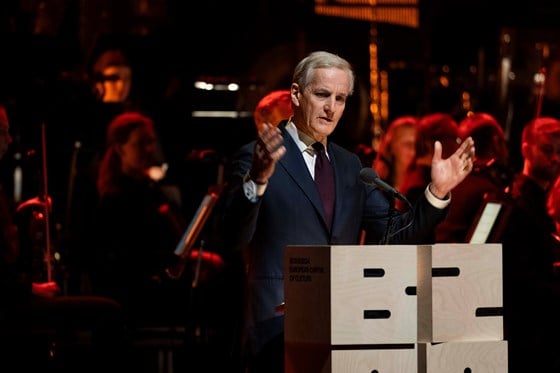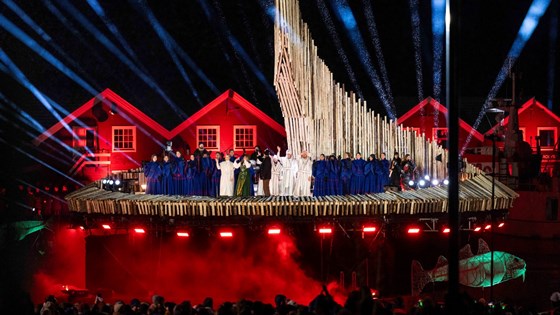Speech by the Prime Minister at the opening event – Bodø 2024, European Capital of Culture
Speech/statement | Date: 03/02/2024 | Office of the Prime Minister
By Prime Minister Jonas Gahr Støre (Bodø)

Your Majesty,
Ladies and gentlemen,
I am delighted to start by quoting Rolf Jacobsen’s poem: ‘It is long, this country of ours. Most of it is north.’ But let us not stop there. Toda
y, we broaden our perspective, and say most of Europe is north.
We are gathered here in Bodø – and we are very proud of Bodø – but this event unites all of us throughout Norway.
Her Majesty The Queen – whom we just saw on the ski slopes (in the film) – spoke about the bonds between us.
Culture is all about creating bonds, nurturing these, and allowing them to grow.
Bonds with each other, with others in our country, and with countries beyond our borders.
This is a year, and a day, for us to celebrate, and truly experience, how we are connected to Europe beyond the mountains and across the ocean. And how we are connected to another time and a cultural heritage.
Connection breeds a sense of belonging. And what could be more important – enhancing our shared resonance, the harmony in our society.
Building ties is an investment, a bit like depositing money into a savings account, except it is not something we can withdraw as cash. It is an investment in social capital, in our trust in one another.
This social capital yields substantial gains. The benefits of shared culture are of crucial importance, although they are not always quantifiable. Their value may lie precisely in the fact that these benefits are difficult to measure.
Thus, my friends, we must – and now we have the chance – showcase our wares. Talk about the exhibits, the performances, the workshops, the sculptures. Be inspired and outraged – ask each other did you see that exhibit? What was the artist trying to say? What is this performance trying to say? For all the events that await us here.
On behalf of everyone in Norway, I would like thank all of you who took on the task of applying for Bodø to be designated the European Capital of Culture. I would personally like to thank (Former) Mayor Pinnerød and all the dedicated people involved in those efforts. We know that there were also those who opposed the idea, and the process had to contend with obstacles along the way.

I would also like to thank the army of volunteers who make these kinds of events possible. We were met by a group of these volunteers when we landed at the airport today. A special thank you to all of you.
And now here we are. I would like to say to the people of Bodø, the people of the north: today is a proud day indeed. All of us in Norway are proud of our Capital of Culture.
This isn’t really anything new, because Bodø has long been a city of knowledge, the seat of a diocese, a business centre, a fishing port, and it has a great football club (I know this because I watched them almost beat Arsenal).
Bodø is also known for its unpredictable weather – and this year of culture is, in fact, born of the storm – with the storm – and, as I mentioned to some of you here, the only other time in my life I have followed the weather forecast so closely was before my own wedding.
And now Bodø is the 2024 European Capital of Culture, and that means you represent more than the city and the municipality. Bodø is now representing nothing less than Norway as a whole.
From the Stormen Concert Hall and the many events to come, we are embroidering new threads in the tapestry of our ties with Europe. Don’t forget how closely we are connected. Earlier today we heard the story of ‘the Italian’ (Pietro Querini) who was shipwrecked on – or perhaps deliberately sailed to – Røst.
Our societies are closely interwoven and knitted together through politics and agreements, trade and investments, research, and now through many forms of cultural expression as well. This is perhaps the strongest stitch in the rich fabric that unites us, because the strands being spun outwards from Bodø today have actually come to us from Europe and other places in earlier times.
We have always been influenced by ideas and currents from Europe and we have exerted influence back into the mix. This dynamic of give-and-take has shaped Norwegian culture for centuries.
We are always a part of something bigger, as individuals, as cities, as countries – and as the human race.
When I look out at the port, where we will be going later, it occurs to me:
Coastal towns are by definition open. Norway has a long coastline – with sea areas and a continental shelf that are seven times larger than its land territory. And if you approach Norway from the west, you will meet this thin strip of land where people live, with the coast that is its hallmark – you are embraced by the harbour which is open to the sea, with the quay and the breakwater as its welcoming arms.
And everything came here by sea – goods, people, ideas – and that is why the Stormen Concert Hall is located so close to the harbour. To receive and welcome.
I would like to close by pointing out three unique aspects of this year’s European Capital of Culture.
First, as we have all been saying, Bodø is the very first European Capital of Culture in the Arctic. And Tromsø as the first Arctic city has been awarded the status of European Youth Capital in 2026. We are putting north at the centre of the map.
Cultural life above the Arctic Circle reflects the lives and work of people in the far north. But they are not living on the outer boundaries of the world. Right now, we are a hub, and as a politician from Norway who spends a lot of time travelling, I have learned that it is useful to have a map to show my international colleagues, because many people have no idea of where this part of the world really is. That we are approximately 2 000 km from the North Pole (as the crow flies) and almost 2 000 km from Copenhagen (driving distance). So we are at the centre.
Therefore: show the rest of Europe all that the Arctic has to offer; the natural surroundings, the colours, the resources, the people, the music, the art, the possibilities. And be brave, make full use of the wonders of the north.
Second, to echo the words we just heard from the President of the Sámediggi (Sámi Parliament), I am pleased that Bodø 2024 is placing the spotlight on Sámi culture. As the President pointed out, Sámi culture is a key component of cultural life in the north.
As a society, we have a great deal to learn from the history and cultural heritage of the Sámi people, as well as their knowledge of how to coexist with nature. As a society, we also have much to make amends for in our relationship with the Sámi people, our people in our country, and this year we will demonstrate ways in which culture is a driving force for maintaining sustainable communities here in the north.
Third, the security policy landscape in Europe has changed, and a new seriousness has descended over our continent. Not just one, but two wars are being waged close at hand.
History makes it clear that North Norway has always been part of a creative community that transcends national borders. At present, the prospects of close cooperation with Russia are slim, but when this again becomes possible – and we need to hold on to the hope that it will one day – then culture may again serve as the most important door-opener, as it did in the 1990s.
While we are waiting for this to happen, we will deepen Nordic cooperation here in the north and invite the rest of Europe to join us.
I wish Bodø 2024 – the organisers, participants, volunteers, and audiences – a year of creativity, a year filled with surprises, exciting initiatives and even closer ties to the Europe to which we belong.
Think big, aim high, dream new and reach wide! Let Bodø work its magic on the world this year.
Thank you.